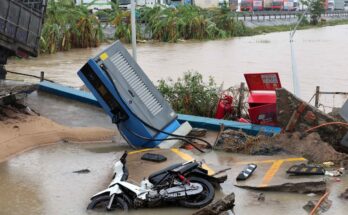Nearly 200 countries meeting in the Brazilian Amazon adopted a modest consensus on climate action on Saturday at COP30, with no plans to phase out fossil fuels. A disappointing result for Europe but welcomed by some delegates, in a year dominated by geopolitical competition. The United States is the only major country not present in Belem.
“ The international community has a choice: continue or give up. We choose the first option “, said Luiz Inácio Lula da Silva, president of Brazil, on the sidelines of the G20 in Johannesburg, emphasizing that “ multilateralism has (will) prevail “. But in Belem, the atmosphere was less euphoric. European countries said they would prefer an imperfect compromise to the dissolution of the main forum for climate cooperation.
“ We will not hide that we would prefer to have more », European Commissioner Wopke Hoekstra admitted, looking exhausted after last night’s talks. “ I know it’s a bit intangible, but doing something together has enormous value », he insisted, assuming the result “below European expectations, but necessary to maintain collective dynamics”.
An indirect reference to the exit of fossil fuels
The text adopted by the 194 member states of the Paris Agreement and the European Union contains only indirect references to the exit from fossil fuels, referring to decisions taken in Dubai during COP28. Lula failed to rally oil-producing countries, North and South, or developing countries to convey a common ambitious message.
In contrast, developing countries have secured commitments calling for a tripling of financial assistance for their adaptation by 2035, a cap reserved for the most vulnerable groups. For China, COP30 is “ success in very difficult situations », According to negotiator Li Gao. India, South Africa and Russia have also welcomed work in Belem. Beijing and its allies from developing countries have achieved the first goal: the establishment of a “dialogue” on global trade in relation to climate, an explicit reference to criticism targeting carbon taxes at borders, particularly in Europe.
As promised by Lula, the COP plunged delegates into the reality of the Amazon: humid heat, torrential rain, air-conditioned tents weakened by bad weather and, on Thursday, fires that poisoned several people. Ten years after the Paris Agreement, humanity continues to increase its consumption of oil, coal and gas. From Tuvalu, threatened by the rising Pacific, to Jamaica, hit by a historic hurricane, the countries most affected have expressed their anger at global inaction and demanded more resources.
The goal of limiting warming to 1.5°C is now unattainable
Lula, an octogenarian, wants to be a bridge between the South and the North. Just before the COP, he took responsibility for issuing permits for oil exploration off the coast of the Amazon, while calling for a “roadmap” leading to the release of fossils. A line that has pushed countries to support a rapid transition, but has failed to oust staunch opposition from Saudi Arabia, India or even Russia.
The “true” COP has at least confirmed one observation: the goal of limiting warming to 1.5°C is now out of reach. The last eleven years have been the hottest on record. The UN and the IPCC president are calling for the duration of this overload to be reduced as much as possible, which can be measured in decades.
On the other hand, Brazil kept its promise to hold a “people’s” COP. Tens of thousands of activists, indigenous people, trade unions and civil society organizations rallied in Belém on 15 November, the first since Glasgow in 2021. The President of COP30, André Correa do Lago, interrupted the negotiations to hold several hours of dialogue with representatives of the indigenous people who were blocking the entrance to the site. A photo of him holding a native baby in his arms spread throughout the world. The fact remains that the weekend’s fires and Europe’s frustration will also mark the memory of this first Amazon COP.


